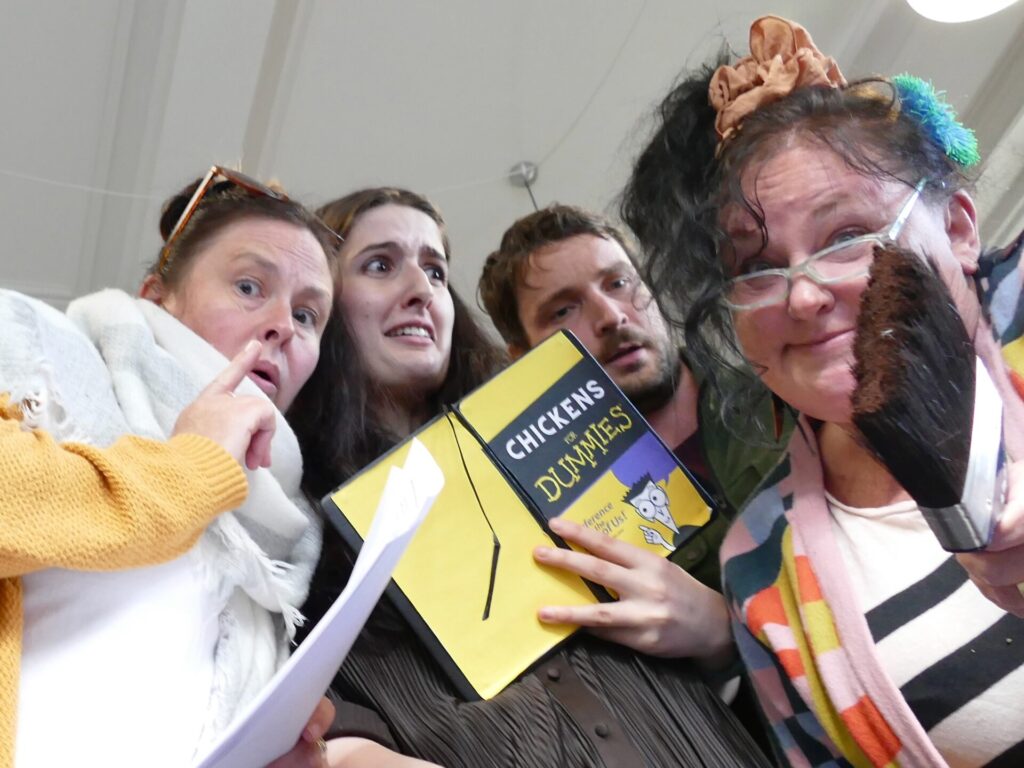Lessons Learned From Hannibal Lecter
New Athenaeum Theatre, 24 The Octagon, Dunedin
19/03/2023 - 22/03/2023
Production Details
Playwright: Angela Pope
Director: Miriam Noonan
‘Lessons Learned from Hannibal Lecter’ is a quirky comedy being brought to the Dunedin Fringe by a group of well known local actors. The script was developed during last year’s Ōtepoti Theatre Lab, and a reading of the play was well received at last year’s Dunedin Arts Festival.
Written by Dunedin writer, Angela Pope, the play is an adaptation of her short story, ‘Lies’ which was awarded the Sargeson Prize in 2020. She teams up again with emerging director, Miriam Noonan, and stalwarts of the Dunedin acting scene, Clare Adams (playing Nan) and Sara Georgie (playing Mrs Lee). New additions to the cast are Maegan Stedman-Ashford (playing Tracey) and Chris Watts (playing Marty).
The play tells the story of Tracey, a young woman disabled in an accident. Angry at the world, she responds with outrageous stories when people ask her how she came to be injured. However, when she is asked by her boss, Mrs Lee, to take in some ex battery hens from the local chicken farm, a softer side to Tracey is revealed.
Clare Adams: Nan
Sara Georgie: Mrs Lee
Maegan Stedman-Ashford: Tracey
Chris Watts: Marty
Martin Swann: Lighting
Theatre ,
A cracker of a comedy
Review by Helen Watson White 20th Mar 2023
This is a cracker of a comedy, fizzing and firing all over the place – but in a good way. In fact, the seamless co-ordination of a variety of parts for four actors shows there was discipline in its making, director Miriam Noonan keeping benign but complete control. These people know a stage joke works only if you don’t take it too far, and nobody does that at any point, although they must have been tempted, it is so very funny.
Lessons Learned from Hannibal Lecter is adapted from Angela Pope’s short story, ‘Lies’, which in 2020 won the Open Division of the Sargeson Prize. Developed in 2022 through Ōtepoti Theatre Lab, then given a public reading at Dunedin’s Arts Festival, the piece is now a proven success in two quite different media. The stage version adds some well-chosen theatrical embellishments (including very good lighting by Martin Swann) to what was already an entertaining and even involving story.
Maegan Stedman-Ashford as Tracey, walking with a stick after a bad accident, anchors the play in her character’s physical and emotional reality. There’s a well-judged balance between her bitterness at being restricted to working in a dairy (exquisitely defined by the actors’ beeps of doorbell and Paywave), and her hope, only once articulated, of returning to her job as a roofer, which she loved – ‘and I was good at it too.’
Because everyone asks, tiresomely, how she got to be disabled, Tracey’s strategy has been to offer a fresh pack of lies to each inquiry. The idea that she was dropped by her circus partner from a high trapeze (this fantasy enacted by the other actors whizzing and careening about the stage) has the advantage that there’s someone to blame. An alternative scenario about her brave rescue of a dog turns the others into excitedly panting, shivering canines. Sometimes she re-tells a story with regrettable inconsistencies: ‘It’s the drugs I’m on…’
Real life intrudes in the form of Chris Watts as a very believable Marty, who admits he only visits the dairy to see Tracey, but asks why does she lie about what happened to her? Her reason is plain: why would she want to reiterate, when that meant returning to the shittiest day of her life? It transpires that Marty’s brother died from rolling his tractor back on the farm. The two develop a connection through sharing these horrid – and inexplicable – experiences.
Doesn’t sound very funny, I know, but there’s a sub-plot. The dairy owner, Sara Georgie as Mrs Lee, is trying to re-home some hens released from battery cages, and persuades Tracey to take four. Again, reality – or mortality – intrudes, as one by one they keel over (‘ex-battery hens can cark it, just from exhaustion’, we are told). The humour of having (imagined) hens on stage at all ramps up as the actors supply all varieties of appropriate clucking, according to the mild, serious or half-crazed distress of the hapless birds. When Tracey decides to give Marty the last remaining hen, named Hannibal Lecter because of hints ‘she’ was cannibalizing her colleagues, we are given the best dialogue I’ve ever heard between a human being and a laying hen, played for a sustained time by Sara Georgie (usually Mrs Lee), in moving and imaginative detail.
It is Clare Adams as Tracey’s Nan, however, who nearly steals the show, with her half-plausible and half-fantastic portrayal of a fallible, colourful gran who thinks she’s looking after her disabled grand-daughter, when the latter realizes she is rather needed to look after her. Outside of that character, Adams lends her fabulous whole-body voice to the interludes, where the players enact tantalizing snippets of well-known pop and action songs, Slice of Heaven lending its own rich moment of nostalgia, but without words.
Copyright © in the review belongs to the reviewer





Comments